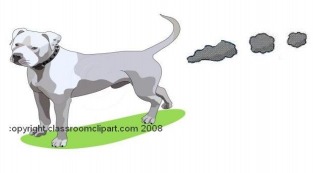Clearing the Air About Flatulence
Although not common in cats, flatulence is a very common problem in dogs. There are several possible causes. An acute bout of intestinal gas usually results from some sort of dietary indiscretion. Perhaps the pet raids a garbage can or is slipped an inappropriate food item by a visiting friend or relative. This produces a short term bout of flatulence with or without other digestive symptoms and is usually self limiting within a few days (although it may seem longer!). Chronic flatulence may signal a problem with the diet. Most pet foods contain ingredients that are inconsistent with a dog or cat's carnivorous nature. These ingredients include but are not limited to wheat, rice, corn, soybeans and certain vegetables. Wild carnivores eat little if any of these foods. The complex carbohydrates contained in these foods are easily fermented by the resident micro - organisms in the digestive tract resulting in gas production. Another problem with pet foods is that they are processed at high temperatures. This processing reduces digestibility, especially of proteins. Incompletely digested foodstuffs in the bowels are also fermented by the resident micro-organisms. Another possible cause of flatulence in an imbalance in the digestive tract bacteria.
These situations are usually easy to remedy. In an acute situation, keep the pet off solid food for a day and give activated charcoal tablets or capsules. Activated charcoal absorbs the gas and toxins in the gut. Activated charcoal tablets or capsules may be found in most health food stores. The dose depends on the size of the pet and the product. A rule of thumb is as follows: cats and small dogs - ¼ the dose for a person listed on the package; medium size dogs - ½ the dose and large dogs give the full human dose. I would then recommend starting the pet on a fresh food diet supplemented with digestive enzymes and friendly digestive bacteria to promote optimum digestive function. If a fresh food diet is out of the question, at least use the enzyme and probiotic supplement.
If a pet has a chronic flatulence problem, a supplement containing digestive enzymes and friendly digestive bacteria is my first step. This supplement improves digestion and absorption of nutrients. The gut bacteria will then have less to ferment and the flatulence will be reduced. I also prefer a low carbohydrate, fresh food diet .
If after trying the above suggestions, the flatulence problem persists, it is possible that the pet has a problem in gut function. This can effectively be treated holistically. Consult with a holistic practitioner should this situation arise.
Russell Swift, DVM, HMC
These situations are usually easy to remedy. In an acute situation, keep the pet off solid food for a day and give activated charcoal tablets or capsules. Activated charcoal absorbs the gas and toxins in the gut. Activated charcoal tablets or capsules may be found in most health food stores. The dose depends on the size of the pet and the product. A rule of thumb is as follows: cats and small dogs - ¼ the dose for a person listed on the package; medium size dogs - ½ the dose and large dogs give the full human dose. I would then recommend starting the pet on a fresh food diet supplemented with digestive enzymes and friendly digestive bacteria to promote optimum digestive function. If a fresh food diet is out of the question, at least use the enzyme and probiotic supplement.
If a pet has a chronic flatulence problem, a supplement containing digestive enzymes and friendly digestive bacteria is my first step. This supplement improves digestion and absorption of nutrients. The gut bacteria will then have less to ferment and the flatulence will be reduced. I also prefer a low carbohydrate, fresh food diet .
If after trying the above suggestions, the flatulence problem persists, it is possible that the pet has a problem in gut function. This can effectively be treated holistically. Consult with a holistic practitioner should this situation arise.
Russell Swift, DVM, HMC

